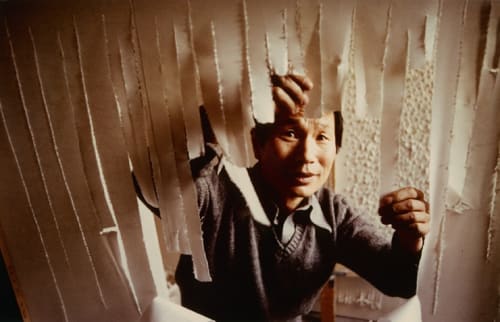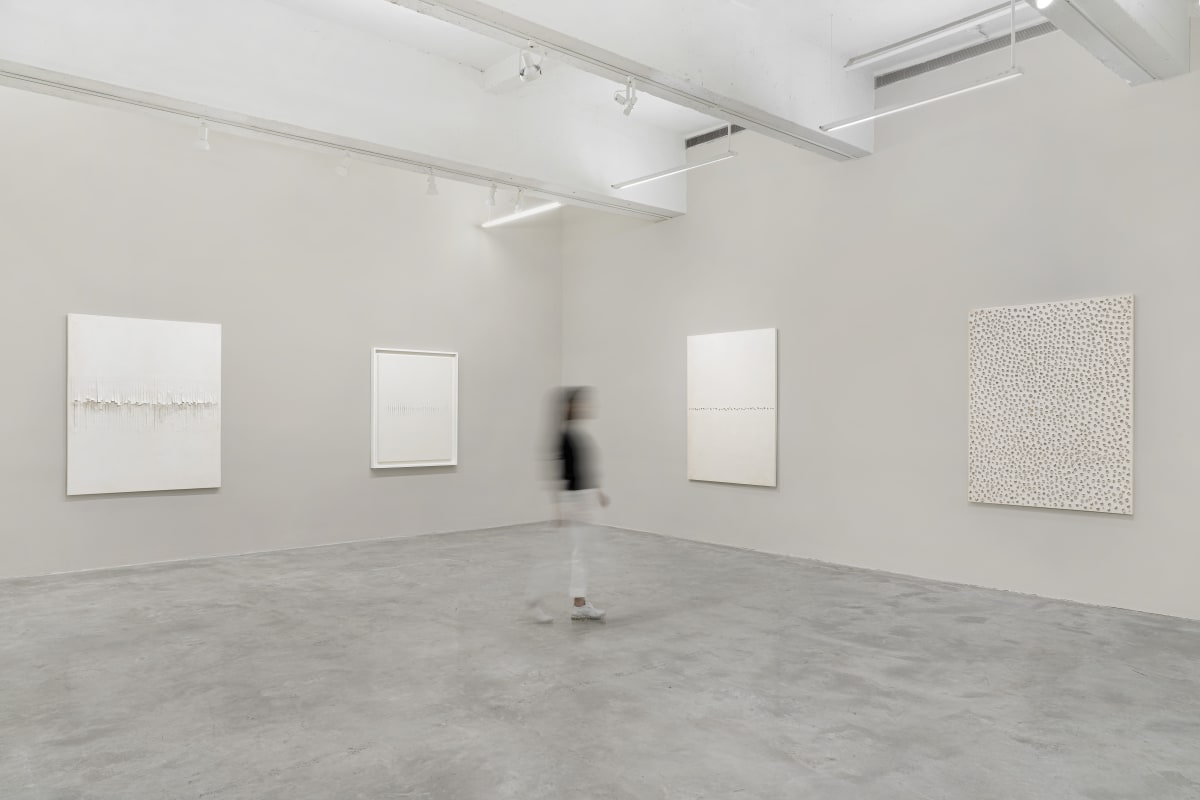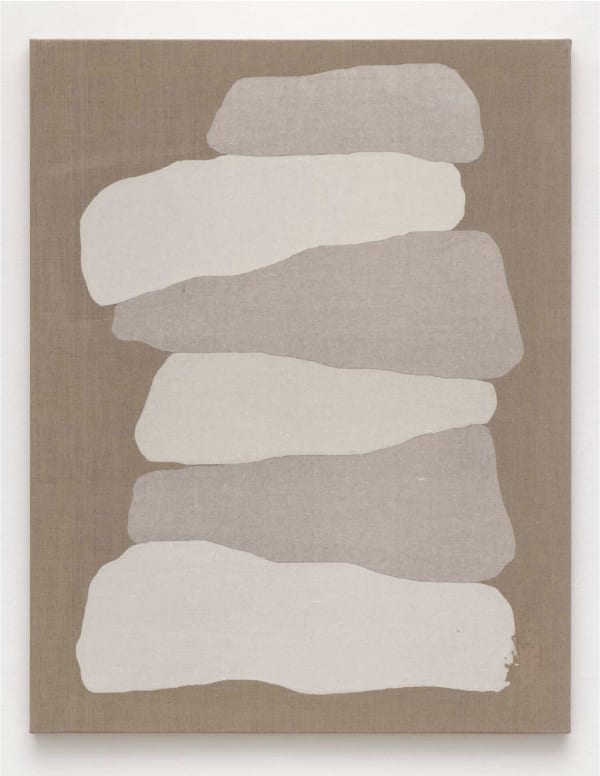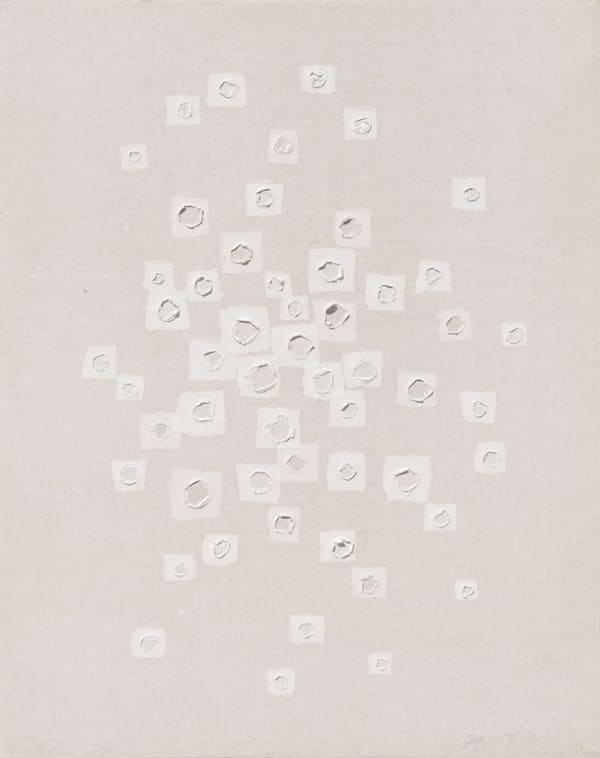Kwon Young-Woo's (1926-2013) works explore the relationship between traditional materials and abstract expression. The artist is considered as a pioneer in Korean abstract art known as Dansaekhwa. He enrolled at Seoul National University's art school as a member of its first class with a major in Oriental Painting in 1946, and also earned a Master of Fine Arts from the same school in 1957.
In his early career, Kwon worked with ink painting to achieve pure harmony of paper and ink; however, in the early 1960s he soon began working solely with paper and developed his own style. Insisting only on paper, Kwon moved away from brush and black-stone ink and challenged traditional Western uses of paper and canvas. He would use his fingernails to scratch and tear paper and then stack another layer over it. Kwon's layers-upon-layers of glued paper turned flat canvas into three-dimensional sculpture. By defying the conventional use of paper, Kwon added a new dimension by being able to view the tactility of paper from all directions. Along with this technique, Kwon also took advantage of the blotting nature of ink by applying it onto the torn edges of his paper.
Kwon Young-Woo has participated in international exhibitions including the Tokyo Biennale (1965), São Paulo Biennial (1973), and Five Whites from Korea at the Tokyo Gallery (1975). Kwon Young-Woo’s work was also exhibited at Jacques Massol Gallery, Paris in 1976 where Kwon was a longtime resident. More recently Kwon Young-Woo was included in the exhibition on Dansaekhwa, at the 56th International Art Exhibition — la Biennale di Venezia, curated by Yongwoo Lee, founding director of the Gwangju Biennale in 2015. Other major solo exhibitions include Kwon Young Woo: the Life in the Papers held at the Seoul Museum of Art in 2007, and his major retrospective at Ho-Am Art Museum, Seoul in 1990. Kwon received the Artist Award twice from the Korean Minister of Culture for his works Fantasy of the Seashore (1958) and Road to an Island (1959). Additionally, he was honored as the 1998 Korean Artist of the Year and awarded the Silver Crown Medal of the Order of Cultural Merit (2001) and Gwangju Culture & Arts Order (9th Huh Bak-ryeon Prize) (2003). His works are held in many important permanent collections including the National Museum of Modern and Contemporary Art, Korea; Leeum,Samsung Museum of Art, Seoul, and the British Museum in London. Kwon Young-Woo died in Seoul on November 14, 2013.
-

Kwon Young-Woo
Gestures in Hanji 7 Mar - 30 Apr 2022Learn More -

Art Without Borders
30 Nov 2020 - 30 Jan 2021Learn More -

Rhythm in Monochrome | Korean Abstract Painting
Tokyo Opera City Art Gallery 14 Oct - 24 Dec 2017Rhythm in Monochrome: Korean Abstract Painting at the Tokyo Opera City Art Gallery. This exhibition features Kim Whanki, Kwon Young-Woo, Chung Chang-Sup, Park Seo-Bo, Chung Sang-Hwa, Ha Chong-Hyun, and Lee...Learn More -

When Process Becomes Form: Dansaekhwa and Korean Abstraction
The Boghossian Foundation 20 Feb - 24 Apr 2016Kukje Gallery / Tina Kim Gallery and The Boghossian Foundation – Villa Empain present: When Process Becomes Form: Dansaekhwa and Korean Abstraction Chung Chang-Sup, Chung Sang-Hwa, Ha Chong-Hyun, Kim Whanki,...Learn More -

Dansaekhwa In Venice
Collateral Event of the 56th International Art Exhibition 15 May - 18 Aug 2015Learn More
-

Abstractions That Record the Scars of Trauma
Hyperallergic April 12, 2022The more I learn about artists associated with the Dansaekhwa movement that began flourishing in Korea in the late 1960s, the more I realize how...Learn More -

8 Fascinating Finds from the FOG Design+Art Fair in San Francisco
Galerie Magazine January 15, 2020The booming tech industry has yielded a crop of new collectors who favor younger new-media artists, as well as those bridging utilitarian design with sculptural...Learn More -

Kwon Young-woo discovers 'Koreanness' in paper
The Korea Times March 20, 2017Kwon Young-woo discovers 'Koreanness' in paper By Kwon Mee-yoo Korean artist Kwon Young-woo (1923-2013) spent his entire career pursuing the essence of Oriental painting, but...Learn More













